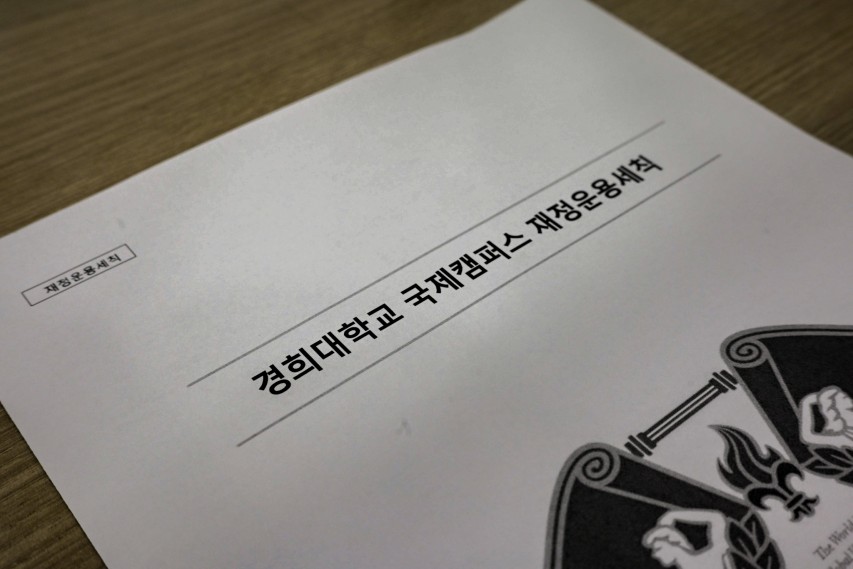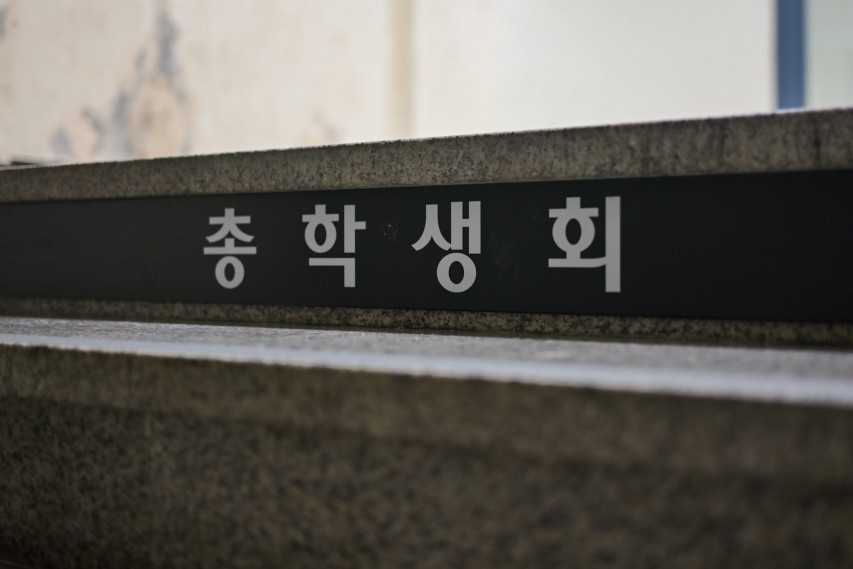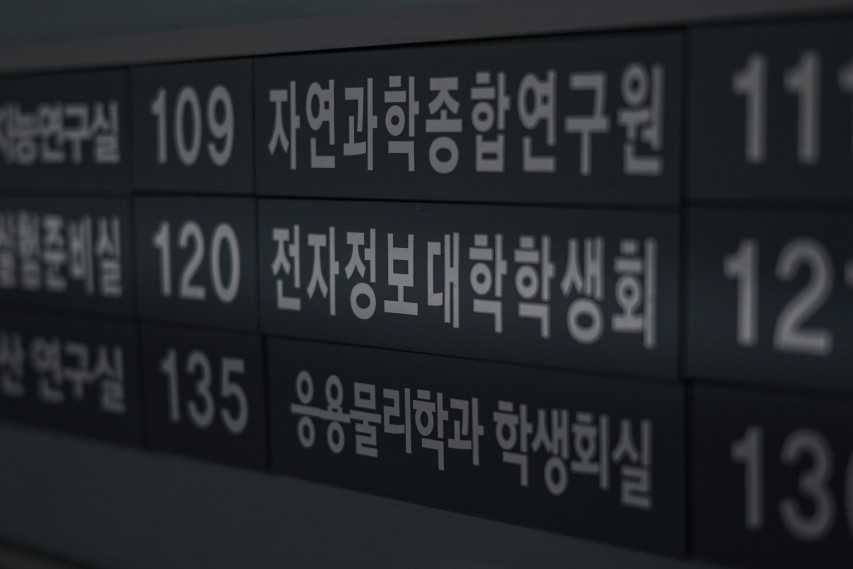[Campus] Invisible Money: Affiliate Profit Threatens Transparency in Student Society
The concerns about affiliate profit were realized by the inappropriate budget use in the College of Electronics & Information (CEI) student association case. Exploiting the lack of a regulatory system and the weak obligation to disclose information, the former president of the college intransparently managed and used the profit. This has now presented the student society with the task of establishing a preventive system to deter similar incidents from occurring again.

Kyung Hee University Global Campus Financial Management Regulation
Affiliate Profit: Becoming a Primary Funding Source
Affiliate income refers to the compensation received by a company for promoting its products or services. As the demand for student participatory activities rises, student associations have been drawing more funds through this method, beyond the school funds and self-governing body fees.
The scale of student associations’ promotions reveals the rising amount of affiliate profit. Through LinkTree shared by Seoul and Global Campus General Student Associations (GSA), six and 17 affiliate services are available, respectively.
The local market surrounding the University also offers affiliate services. It is easy to find various cafes, restaurants, and other commercial facilities that have contracts with Kyung Hee University (KHU) student associations, ranging from GSA to college and department levels, showcasing their diversity.
The benefits gained through these partnerships also take various forms. One method is direct cash receiving. The student associations will promote the contracted business through their social media, and then receive a certain amount of money.
Non-monetary rewards are also available. Partner businesses will offer student discounts or provide additional services to contracted student associations, contributing to revitalizing university commercial areas.
Where Does the Money Go?
The affiliate service benefits its stakeholders, students, the student association, and business partners; however, there are no detailed rules for managing the profits. KHU Student associations manage these profits based on the Financial Management Regulations, categorizing the budget into three types: self-governing body fees, student association fees, and other revenues.
According to the GSA, while other revenues refer to “profits earned from projects conducted using their own budget,” affiliate profits do not fall into this category. This indicates the student associations do not have a duty to openly share the information regarding the profit.
Another barrier is the confidentiality clause in the contract. To prevent excessive competition from driving up affiliate profits, businesses sometimes include specific clauses in contracts. As a result, the limited scope of disclosure makes monitoring difficult. “I only know the budget status through LinkTree, which is open to everyone. Even within the student association, only budget managers know the details, such as the president, vice president, and chief of the executive committee,” said the vice director of the public relations team of the College of Applied Science student association.
Due to the lack of central regulations and limited disclosure obligations, the transparency of affiliate profits depends entirely on the budget managers. "KHU student associations appear to have different management systems," the College of International Studies student association explained. "Some colleges use private accounts, while others use accounts for an affiliate contract. The extent of disclosure to student association members varies. This differs depending on their customs or regulations."

Entrance of the Global Campus General Student Association's office, third floor of the Student Center
Improper Fund Usage by the CEI Student Association: Highlighting Flaws in Affiliate Profit Management
At this point, the concerns about affiliate profit have actually materialized, raising the urgency for enhanced transparency. In late August, Lee Yu-chan, the former president of the CEI, was accused of misusing affiliate profits through whistleblowing, according to the Central Management Committee (CMC) meeting minutes.
Through the Financial Audit Committee (FAC) established by the CMC, Lee’s intransparency management and personal use of affiliate profits were confirmed. He earned approximately 4,000,000 won from affiliate contracts and booth operations during the spring festival. However, he did not transfer the profits from his private account to the public account and used about 3,000,000 won for personal purposes, such as small-scale gatherings.
The FAC ruled that Lee had engaged in the "act of intentionally concealing evidence and undermining the transparency and fairness of financial management," imposing a penalty of 192 demerit points. Thus, he faced restrictions on his voting rights in the body in which he was involved, lost eligibility for election, and was suspended from financial-related duties until the end of his term. Subsequently, he resigned from his presidential role on August 27.
The background of the case illustrates how the vulnerability of affiliate profit had been exploited in harmful ways. Kim Woo-seok, the current acting president of the CEI student association, explained, "We never know the exact amount of money received and spent unless Lee updates the records. He was the only one who knew the contract clauses and could determine how the funds were used."
Kim added, "Lee suddenly canceled the summer volunteering program due to budget shortage, yet held large-scale sports competitions. In the case of the futsal tournament, the account balance did not decrease even though the event had already taken place," explaining the suspicious points of Lee's inappropriate budget usage.
This case demonstrates that the absence of clear guidelines and confidentiality clauses will lay the groundwork for secretive budget handling and ultimately lead to improper management practices.

Room 120 of the College of Electronics & Information building, the college student association's office
New System Efforts but No Progress—Resolution Needed
More than imposing penalties, Global Campus student associations discussed implementing preventive measures at the CMC meeting. Park Byeong-jun, Global Campus GSA president, cited the Seoul Campus as an example when suggesting "abolishing the current Financial Management Regulation and introducing a central audit system to expand the investigation scope." He emphasized, "It makes no sense to do nothing when incidents occur."
However, the central audit system could not be implemented due to practical reasons. Establishing this new system requires not only creating new regulations but also having all student associations across campus adjust their management systems. To introduce it legitimately, all preparations must be completed before the General Election, which will be held from November 24 to 26. Therefore, the CMC members acknowledged the time constraints for perfecting the system.
Moreover, the Seoul Campus model also does not ensure the right to control the real issue. 23 student self-governing bodies in the Seoul Campus conduct investigations into themself through the Central Financial Audit Committee. However, the auditing range is limited to self-governing fees, and does not extend to affiliate profits.
As an alternative, a revision of the Financial Management Regulation was proposed. During the CMC meeting, Park emphasized the regulation’s restricted supervisory authority and stressed the need for reform.
However, the regulation revision even faced criticism. The College of Life Sciences student association mentioned that “The current Financial Management Regulation has undergone numerous revisions, yet it still cannot achieve perfection. A revision for this General election could merely be a superficial measure to address the practical problems.”
In the end, the CMC members narrowed the options down to two directions—revising the Financial Management Regulation or establishing a central audit unit—but both will be discussed further after the University Festival.
Despite the CEI case clearly highlighting the risks of affiliate profits, preventive measures have not been promptly introduced. To establish a robust foundation against budget misuse, a concrete solution must be devised before the General Election—just two and a half months away. The consistent attention and effort of the student society will be crucial to ensuring transparency of student associations.
I agree to the collection of personal information. [view]

